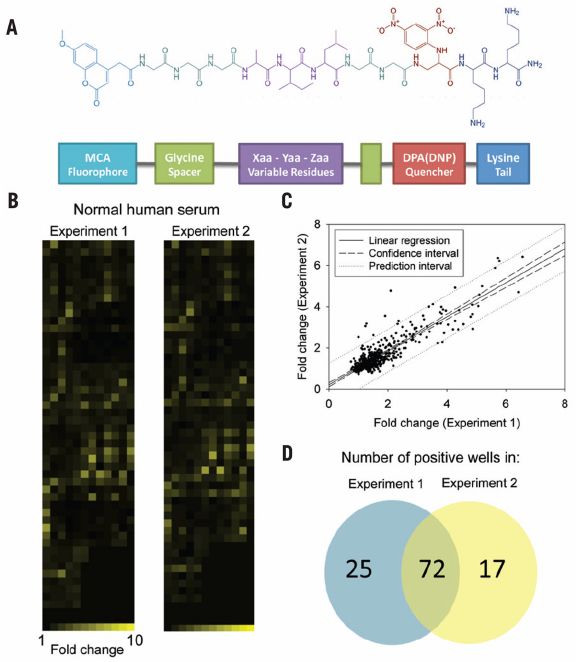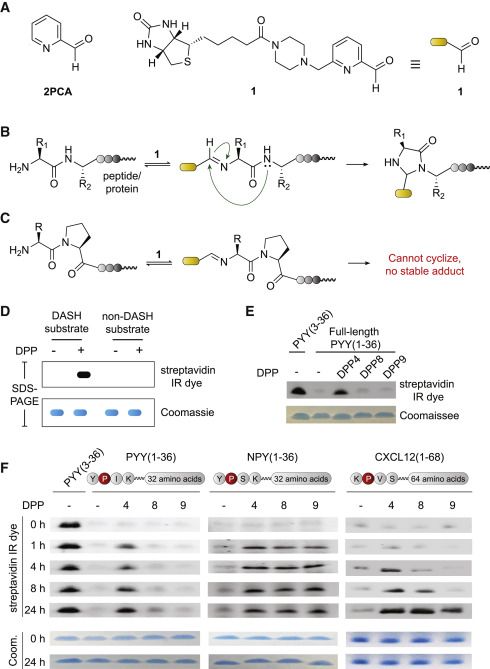Protease substrate profiling is a crucial scientific technique in the study of proteases. These enzymes, which break down proteins and peptides, play a key role in numerous biological processes. Some of these include digestion, immune response, cell cycle progression, and apoptosis. Gaining a deep understanding of these enzymes, their mechanisms, and their specific target substrates is critical for the advancement of pharmaceuticals and other biotechnological applications.
 Overview of protease substrate specificity profiling approach (Douglas S Watson, et al., 2011)
Overview of protease substrate specificity profiling approach (Douglas S Watson, et al., 2011)
Service Process
Our Kinase Substrate Profiling service follows an extensive and detailed process which includes:
- Substrate Selection: This initial stage involves the careful selection of the most suitable substrates for the specific kinase in question. We understand that the choice of substrates significantly influences the validity and accuracy of the results. Therefore, we meticulously consider various factors for substrate compatibility and optimal functionality.
- Kinase Reaction: After the substrates have been appropriately selected, we then proceed to the kinase reaction stage. We ensure this process is executed with utmost precision and expertise, maintaining the correct conditions and parameters for the reaction to occur effectively. We acknowledge that the success of the experiment heavily depends on the accurate execution of this step.
- Substrate Detection: Post-reaction, we move on to the critical phase of detecting the phosphorylated substrate. In this step, we employ highly specialized techniques to accurately identify and quantify the modified substrates. We recognize that this process is a delicate task that requires precision and a deep understanding of the methodologies employed.
- Data Analysis: The final stage of our service process is the analysis of the accumulated data. We meticulously examine and interpret the generated data using sophisticated analytical techniques. This step allows us to identify potential substrates for the kinase, providing meaningful insights and conclusions about the kinase substrates.
Throughout each of these stages, we maintain close collaboration with our clients. We provide expert guidance and support to ensure the best possible results, and we value our clients' input and feedback at every step of the process. If you have any questions, need more information, or would like to discuss a potential project, please don't hesitate to contact us. Our team is always eager to help and share our expertise.
Applications
| Application |
Description |
| Drug Discovery |
Protease substrate profiling is essential in drug development for identifying potential drug targets and designing inhibitors. It aids in understanding the substrate specificity of proteases, crucial for developing therapeutics for various diseases. |
| Disease Biomarker Discovery |
It plays a significant role in discovering biomarkers for diseases by identifying protease activity patterns associated with specific conditions. These biomarkers can be utilized for early diagnosis, prognosis, and monitoring of disease progression. |
| Pathophysiology Studies |
Protease substrate profiling provides insights into the role of proteases in various physiological and pathological processes. By analyzing substrate cleavage patterns, researchers can elucidate the involvement of proteases in disease mechanisms and identify potential therapeutic targets. |
| Protease Inhibitor Screening |
This technique is employed for screening and evaluating protease inhibitors by assessing their efficacy and selectivity in blocking protease activity. It enables the identification of novel inhibitors with therapeutic potential for diseases such as cancer, inflammation, and neurodegenerative disorders. |
| Functional Proteomics |
Protease substrate profiling contributes to functional proteomics studies by mapping the proteolytic events occurring in cells or tissues. It helps in understanding protease-mediated proteolysis, protein turnover, and post-translational modifications, providing insights into cellular processes and signaling pathways. |
Case Study
Dipeptidyl peptidases (DPPs) modulate hormones, cytokines, and neuropeptides by cleaving dipeptides following proline from their amino termini. Due to technical challenges, many DPP substrates remain unknown. The figure below illustrates a chemical approach for DPP substrate profiling. (A) The structure of 2PCA (left), and the biotin-coupled 2PCA probe 1 (right). (B and C) 1 forms stable adducts with N-termini (B) unless proline is in position 2 (C). R1 can be any side chain, R2 can be any side chain except proline. The gray circles represent the remaining peptide chain. (D) Schematic of the expected results for a DASH and a non-DASH substrate containing a proline in position 2 incubated with or without enzyme and labeled with 1. (E) Full-length PYY(1-36) was incubated with the indicated enzyme (10 nM) for 4 h before addition of 1 (10 mM, 16 h). (F) PYY, NPY, and CXCL12 (10 μM) were incubated with PBS, DPP4, 8, or 9 (10 nM) for the indicated time, before aliquots were removed, boiled, and labeled with 1 (10 mM). Blots depict probe labeling (streptavidin IR dye) and total protein (Coom.).
 Chemical Strategy for DPP Substrate Profiling (Andrew R. Griswold, et al., 2019)
Chemical Strategy for DPP Substrate Profiling (Andrew R. Griswold, et al., 2019)
FAQs
Here are some frequently asked questions and answers about Protease Substrate Profiling, which will help you understand its importance, mechanism, applications, and reliability. If you have more specific or detailed questions, don't hesitate to get in touch with us directly.
Q: Could you elucidate on what Protease Substrate Profiling is?
A: Protease Substrate Profiling is a highly specialized technique utilized by scientists. It permits them to identify the specific targets, commonly referred to as substrates, that are acted upon by protease enzymes. This process is essential in the field of biology and biochemistry.
Q: What is the significance of studying Protease Substrate Profiling?
A: The study of Protease Substrate Profiling is of paramount importance because it plays a critical role in the development of drugs and therapeutic agents. Furthermore, it also assists in gaining a deeper understanding of intricate biological processes at a molecular level, thereby broadening our knowledge in the field.
Q: Could you explain the working mechanism of Protease Substrate Profiling?
A: The process of Protease Substrate Profiling involves the use of specific experimental techniques and methodologies. These methods are geared towards identifying the substrates of a protease, thus helping in the understanding of how these enzymes work.
Q: Is the application of Protease Substrate Profiling restricted to drug development?
A: Not at all. Protease Substrate Profiling has a broad spectrum of applications. Although it plays a significant role in drug development, its usage extends beyond that to various other areas such as research and biotechnology.
Q: What kind of information can be derived from Protease Substrate Profiling?
A: Protease Substrate Profiling is a powerful tool that can identify the substrates of a protease. This is of crucial importance as it helps to understand the function and role of these enzymes in various biological processes.
Q: Is it possible to profile all proteases using this method?
A: While Protease Substrate Profiling can be used to profile most proteases using common techniques, there are some proteases that may necessitate the use of specialized methods due to their unique properties.
Q: Does Protease Substrate Profiling consume a lot of time?
A: The duration of Protease Substrate Profiling can vary significantly. This is largely dependent on the complexity of the protease that is being studied. Some might take a shorter time, while others might require a more extended period.
Q: Is it possible to perform Protease Substrate Profiling in high throughput?
A: Absolutely! High throughput methods are available for Protease Substrate Profiling. These methods facilitate the simultaneous study of multiple proteases, thereby making the process more efficient.
Q: How reliable and accurate is Protease Substrate Profiling?
A: Protease Substrate Profiling, when done correctly with the appropriate methods and controls, can yield highly accurate and reliable results. This makes it a reliable tool in the study of protease enzymes.

































 Overview of protease substrate specificity profiling approach (Douglas S Watson, et al., 2011)
Overview of protease substrate specificity profiling approach (Douglas S Watson, et al., 2011) Chemical Strategy for DPP Substrate Profiling (Andrew R. Griswold, et al., 2019)
Chemical Strategy for DPP Substrate Profiling (Andrew R. Griswold, et al., 2019)